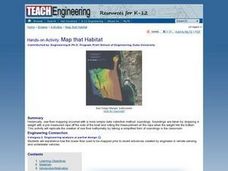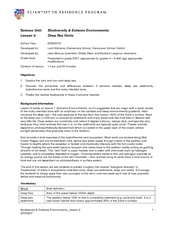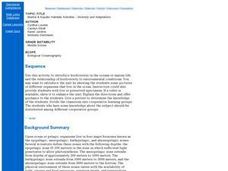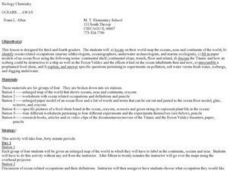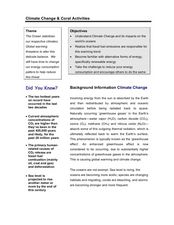Curated OER
Map that Habitat
Students participate in an activity that replicates the creation of sea floor bathymetry by taking a simplified form of soundings in the classroom. They discuss sea floor mapping technologies, sonar, soundings, and remote sensing,...
Curated OER
Deep Sea Vents
Learners study the vent and non vent deep sea and see the differences in habitats. In this investigative lesson students complete a worksheet and work in groups.
Curated OER
Week 8 - Sea Life
Using a magnifier, mini marine biologists examine the barbules of a bird feather. They swirl the it into a mixture of oil and water and then re-examine the feather. After the activity, discuss how the oily feathers pose a problem to sea...
Curated OER
Feeding in the Flow
The National Oceanic and Atmospheric Administration (NOAA) has developed a tremendous library of ocean-themed lessons that can be used in a variety of science settings. "Feeding in the Flow" is one of those activities; Its focus is on...
Curated OER
Animal Habitat Bar Graph
In this graphing activity, students examine a prepared bar graph and record which habitat their chosen animal lives in: desert, city, forest, ocean, prairie, or fresh water. There are no directions but it appears that a class could use...
Curated OER
Lesson Five
Students study ocean habitats and create a habitat zone replica. In this ocean habitat instructional activity students design and construct their own unique habitat.
Curated OER
Invent an Invertebrate
Design a new organism with recyclable art materials! After learning about the coastal biome, learners brainstorm challenges that a plant or animal may face. They use their ideas to create a creature, complete with environmental...
Curated OER
Estuaries, Estuarine Habitats, and Adaptations
Middle schoolers conduct research on estuaries. They design and construct an estuary, describe the physical characteristics of an estuary, and create a diagram illustrating an estuarine food web.
Curated OER
Marine & Aquatic Habitats Activities - Diversity and Adaptations
Learners analyze biozones and how to identify and diagram them. They also research which organisms can adapt to different biozones.
Curated OER
What Lives in Oceans and Wetlands?
In this habitats worksheet, students compare and contrast what lives in an ocean habitat and a wetland habitat. This worksheet is a graphic organizer.
Curated OER
The Elephant Ate a Banana in the Tundra
Students perform a scene with their small group. They identify an animal, act out what the animal does, where the animal would be found, and what the animal eats. They locate the animal habitats on a map.
Curated OER
A Tough Neighborhood
High schoolers describe at least three attributes of the deep ocean physical environment that are radically different from ocean habitats near the sea surface.Students explain at least three morphological or physiological adapt
Curated OER
Kure Waste Chase Game Lesson
Students work together to identify marine debris. They explain the effect of the debris on various ecosystems. They draw different types of ocean currents as well.
Curated OER
Sprinkles 5
In this environment learning exercise, students read the information and complete the survey about their own local habitats and some of the others in Florida.
Curated OER
Oceans Away
Students explore oceans. In this science lesson plan, students locate oceans, seas and continents of the world, identify ocean-related occupations, and complete activities pertaining to food chains as well as pollution.
Curated OER
Climate Change Challenge
Students participate in a demonstration in which they role-play polar bears and habitat components to demonstrate the impacts of climate change on the Arctic Ocean ecosystem.
Curated OER
Climate Change & Coral Activities
Students study how the ocean stabilizes our planet's climates and how global warming is becoming a threat to this fine balance. In this climate change instructional activity, students identify that fossil fuel emissions are responsible...
Curated OER
Building an Underwater Habitat
Students investigate underwater habitats. In this underwater habitat lesson, students study Aquarius and design their own underwater habitat that can sustain life. Students work in groups and present their habitats to the class. Students...
Curated OER
Sea Connections
Students, after locating different marine habitats on a globe, play a card game about ecosystems, food webs and organisms.
Curated OER
No Escape
Via four student handouts, marine biology learners examine the topography and circulation cell of the Fieberilng guyot. Then they examine the number of individual hydroids counted at each depth. Pupils use the information to relate water...
Curated OER
Coral Reef Choreographic ProjectTo
Students enhance their understanding of how animals function in a habitat.Students are scattered individually and in small groups. About half of students make coral shapes in small groups. The other half of students move like animals in...
San Francisco Public Utilities Commission
Recycled Water: A Smart Way to Reuse Water
Learn about wastewater and recycled water with a science reading activity. After learners finish a two-page passage about conserving the water supply, they answer six comprehension questions about what they have read.
Curated OER
What Was for Dinner?
Students examine energy obtaining strategies that are used by organisms in deep reef communities. In this ocean instructional activity students complete an isotope activity.
Other popular searches
- Deep Ocean Habitats
- Deep Ocean Habitats
- Ocean Habitats Year 2
- Science Ocean Habitats
- Ocean Habitats Math
- Ocean Habitats Producers
- Ocean Habitats Inquiry Based
- Ocean Habitats Inquiry
- Ocean Habitats Language Arts
- Powerpoint Ocean Habitats


